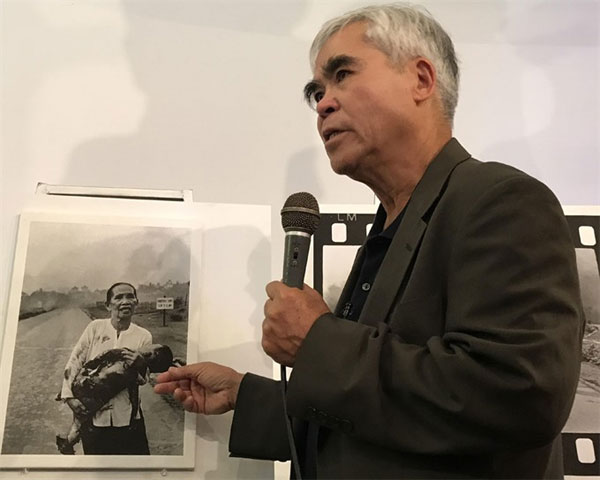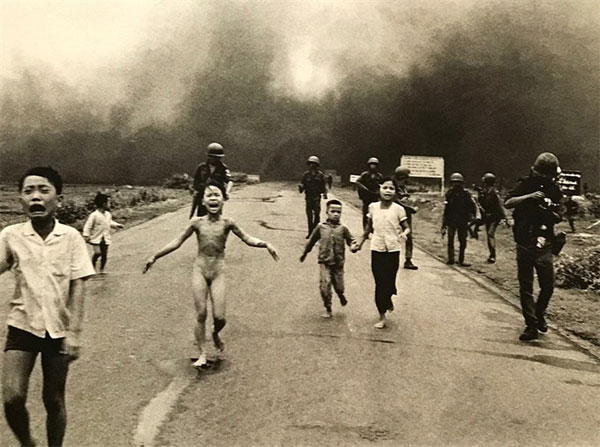VietNamNet Bridge – Former Associated Press war photographer Huynh Cong Ut (Nick Ut) has donated a set of five photos of the American war in Viet Nam and a camera he used during the war to the Vietnamese Women’s Museum in Ha Noi.

|
|
Nick Ut introduces his photos at the donation ceremony at the Vietnamese Women’s Museum on May 6. — Photo: Le Huong/VNS |
The collection include Ut’s photo of Phan Thi Kim Phuc, a nine-year-old girl running naked along the road crying from burns inflicted by a napalm bomb dropped by the US in the southern province of Tay Ninh in 1972, which won a Pulitzer Prize in 1973.
He chats with Culture Vulture at the event.
You return to Viet Nam every April 30 (Reunification Day). Does your return this year mean anything special?
This June 8 will mark the 45th anniversary of the photo Napalm Girl. I want to donate it to the Vietnamese Women’s Museum in Ha Noi. Many museums in the world would like to have this photo and my Nikkormat camera in their collections. But as I’m Vietnamese, I should spare the memorabilia for my homeland. At first I intended to donate more photos to the museum. But then, I decided these five on the American bombing on Trang Bang Town in southern province of Tay Ninh were enough. The photo Napalm Girl has been seen by millions of people and is considered one the fiercest images of the wars. The victims in my photos are mostly women and children, so I think no place is more suitable than this museum. I return to Viet Nam every year. This year the time has significance: I have brought the photos to exhibit here.
You moved to Los Angeles in 1977, you continued to work in the US as a photographer. Did you find it difficult to adapt a new working environment taking photos of Hollywood stars?
After I took the photo of Kim Phuc in 1972, I have been very lucky. I have been helped wherever I go. Sometimes it’s difficult to enter an event without a working ID, but I am widely known and allowed to work. Even when I took photos of an American President, the security men knew me and even asked for my signature.
When I worked in Los Angeles, I covered many incidents. There was violence in African-American areas, where I had to take photos. They pointed guns at me. They didn’t know I was Vietnamese. They thought I was Korean. After I explained, they said they hated Asian people and I had to leave. They might have shot me if I argued with them.
I faced lots of dangerous moments during the American war in Viet Nam and even when I worked in the US, I faced danger.
The most recent was a demonstration against Donald Trump, where people yelled and threatened to break photographers’ cameras.
In short, photojournalism is a dangerous career.
Have you got any advice to young Vietnamese photojournalists?
I hope many more Vietnamese photojournalists win international prizes. I think journalism photos should not be photoshopped. The photographer should always look carefully. Whenever I go, even a press conference, I study every face before shooting.
I see today Vietnamese photojournalists have better cameras and lens than me. But good devices don’t result in good photos. Some people take better photos with mobile phones than those using professional cameras.
The important thing is thinking before shooting. Then photojournalists should choose the best photos to publish, don’t let the editor do that because they don’t like doing that task.
You have just retired. What are you doing now?
I worked for 54 years for the AP. Now I’m very happy to travel around and enjoy life. Although, I was very sad during the first week of my retirement. When I switched on TV and watched the news, I just wanted to rush to the site to take photos. I am still working as a freelancer. I have visited Viet Nam more than before since 1989. I love returning to Viet Nam, to meet my friends in HCM City and Ha Noi. I love Ha Noi because it’s beautiful. I also hope to return to Trang Bang, Tay Ninh one day with Kim Phuc to remember the memories and see how life has changed.

|
|
The historic photo "Napalm Girl" taken by Nick Ut in Tay Ninh Province on June 8, 1972. |
VNS
| related news |